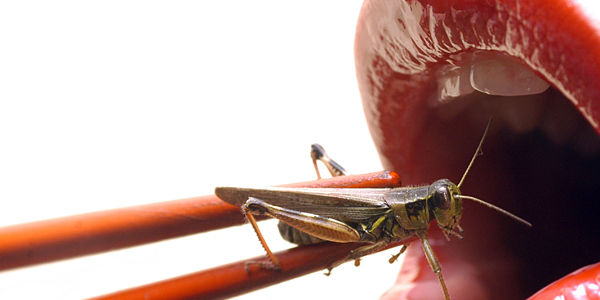
May 29, 2015, by Charlotte Anscombe
Insects: A solution for Global Food Security?
For many people in the UK the idea of eating insects remains the in the realms of the popular reality show, ‘I’m a Celebrity Get Me Out Of Here’. However, worldwide, insects represent an integral part of the diet of over two billion people. Not only can they provide much needed energy, they offer a source of high quality protein, a broad range of essential micronutrient and have a much lower carbon footprint than conventional livestock species.
While a bowl of fried locusts may not appeal to you, how about biscuits and crisps produce from ‘cricket flour’, which is now readily available and represents a highly nutritious alternative to conventional ingredients?
While still very much a ’niche market’ the ability of insects to thrive on waste-streams, not suitable for human (or animal) consumption, makes them an attractive future source of nutrition. Even if they are not incorporated directly into the human diet there is much potential for their use as high quality nutritional supplements for livestock, and particularly, the rapidly expanding aquaculture industry.
Scientists in the School of Biosciences have recently been awarded two research grants to explore the potential role of insects in contributing to the future nutritional needs of an expanding population. In collaboration with Crops for the Future (Malaysia), they have been awarded a £142,800 British Council Newton Fund Institutional Link Grant to study the potential for using insects as a sustainable and affordable alternative to fishmeal and oil for use in aquaculture.
Professor Andy Salter, Nutritional Biochemist, explained that the use of fishmeal and fish oil (derived from wild fish stocks) in aquaculture feeds will become increasingly economically and environmentally unsustainable as their abundance continues to decline and their prices continue to rise. The team will be looking at the use of underutilised crops as nutrient sources to enhance the production and nutritional value of black soldier fly larvae, which will then be incorporated into fish feed as a replacement for fishmeal and oil. An added advantage will be that the compost produced by the larvae can then be used as a fertilisers to improve crop yields. The project is in collaboration with Entofoods, an established company, already working in Malaysia to produce animal and fish feeds from insects.
Closer to home the team has been awarded a £198,482 Knowledge Transfer Partnership grant from Innovate UK to work with Monkfield Nutrition, one of the UK’s biggest insect breeders. Currently, they produce over 4 million insect per week as food for the exotic pet market. However, they are looking to explore potential new markets, including insects for human consumption and livestock feed. The team will work with Monkfield to improve efficiency of insect production and to investigate how the nutritional quality may be manipulated to suit specific markets.
They will also investigate the potential of specific waste streams as insect feed. Professor Salter commented, ‘there is great potential to apply our existing knowledge of the nutritional needs of conventional livestock to insects, in a systematic way that has not been done before’. Jo Wise from Monkfield added ‘we are extremely excited about working alongside the very knowledgeable team at Nottingham, and are confident that this will be a huge step forward for Monkfield’.
The team includes Entomologist, Dr Ian Hardy, Nutritional Biochemist, Dr Tim Parr and Animal Geneticist, Dr Reinhard Stoger.
Written by Professor Andy Salter

Cricket flour? I had no idea that’s already on the market, and I’ve been following the subject of entomophagy closely for some time now. Black soldier fly larvae have gotten a lot of attention lately for their amazing nutritious ‘powers’ and I’m just thrilled with the online buzz this subject is getting!